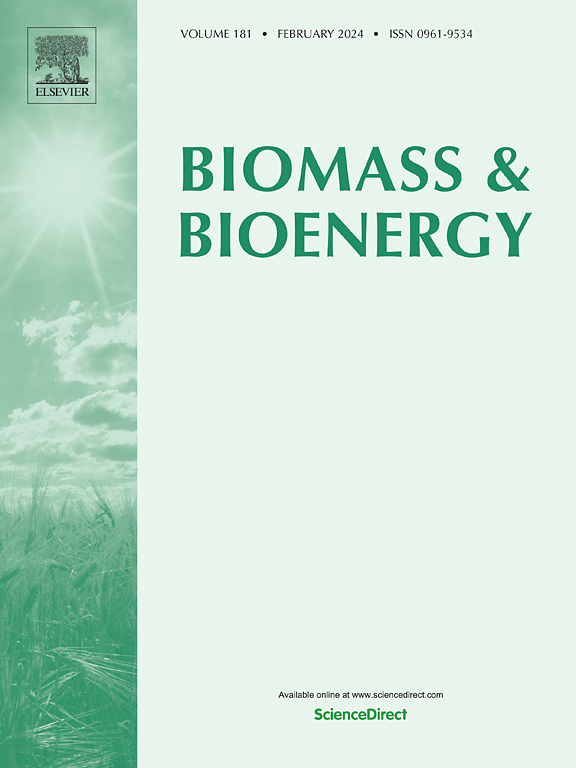Microwave-assisted transesterification of hybrid Garcinia gummi-gutta and Garcinia indica oils: optimization using RSM and meta-heuristic algorithms for high-yield biodiesel production
IF 5.8
2区 生物学
Q1 AGRICULTURAL ENGINEERING
引用次数: 0
Abstract
The limitations of Response Surface Methodology (RSM) in determining global optima in complex biodiesel systems have prompted researchers to explore metaheuristic algorithms due to their efficiency in handling non-linear and multi-modal problems. Additionally, hybrid oils are favored over single feedstocks as they enhance fuel quality, reduce costs, and improve engine performance. In this study, biodiesel was produced from the hybrid oils of Garcinia gummi-gutta (GGG) and Garcinia indica (GI) seeds using microwave-assisted transesterification (MAT). The chemical composition and functional groups of the hybrid oils were characterized through GC-MS and FTIR analyses. A Central Composite Design (CCD) was employed to investigate the effect of MAT reaction parameters (microwave power, methanol to oil molar ratio, NaOH concentration, and reaction time) on biodiesel yield. All the reaction parameters showed substantial contribution to biodiesel production. The derived empirical equation predict with an accuracy of 1.013 %. Four metaheuristic algorithms, Genetic Algorithm (GA), Particle Swarm Optimization (PSO), Mother Optimization Algorithm (MOA) and Secretary Bird Optimization Algorithm (SBOA), were utilized for process optimization, which determined identical optimal conditions. All four algorithms converged on the same optimized MAT conditions, yielding 98.9 ± 0.42 % biodiesel experimentally. SBOA demonstrated computational efficiency in maximizing biodiesel yield with a minimum number of function evaluations compared to MOA, PSO, and GA. The fuel properties of the biodiesel met ASTM standards, confirming their suitability for use in diesel engines. This systematic approach in utilizing underexploited feedstocks through advanced microwave processing and optimization techniques ensures higher biodiesel yield offering a scalable and sustainable model for decentralized production.
微波辅助黄藤油和黄藤油的酯交换反应:利用RSM和元启发式算法优化高产生物柴油生产
响应面法(RSM)在确定复杂生物柴油系统的全局最优解方面的局限性,促使研究人员探索元启发式算法,因为它们在处理非线性和多模态问题方面效率高。此外,混合油比单一原料更受青睐,因为它们提高了燃料质量,降低了成本,提高了发动机性能。本研究以Garcinia gummi-gutta (GGG)和Garcinia indica (GI)种子为原料,采用微波辅助酯交换(MAT)技术制备生物柴油。通过GC-MS和FTIR分析表征了混合油的化学成分和官能团。采用中心复合设计(CCD)研究MAT反应参数(微波功率、甲醇油摩尔比、NaOH浓度和反应时间)对生物柴油产率的影响。所有的反应参数都对生物柴油的生产有很大的贡献。所得经验方程预测精度为1.013%。采用遗传算法(GA)、粒子群算法(PSO)、母体优化算法(MOA)和秘书鸟优化算法(SBOA)四种元启发式算法进行工艺优化,确定了相同的最优条件。在相同的优化MAT条件下,四种算法均收敛,生物柴油的实验产率为98.9±0.42%。与MOA、PSO和GA相比,sba证明了以最少的功能评估次数最大化生物柴油产量的计算效率。生物柴油的燃料性能符合ASTM标准,确认其适用于柴油发动机。这种系统的方法通过先进的微波处理和优化技术利用未开发的原料,确保了更高的生物柴油产量,为分散生产提供了可扩展和可持续的模式。
本文章由计算机程序翻译,如有差异,请以英文原文为准。
求助全文
约1分钟内获得全文
求助全文
来源期刊

Biomass & Bioenergy
工程技术-能源与燃料
CiteScore
11.50
自引率
3.30%
发文量
258
审稿时长
60 days
期刊介绍:
Biomass & Bioenergy is an international journal publishing original research papers and short communications, review articles and case studies on biological resources, chemical and biological processes, and biomass products for new renewable sources of energy and materials.
The scope of the journal extends to the environmental, management and economic aspects of biomass and bioenergy.
Key areas covered by the journal:
• Biomass: sources, energy crop production processes, genetic improvements, composition. Please note that research on these biomass subjects must be linked directly to bioenergy generation.
• Biological Residues: residues/rests from agricultural production, forestry and plantations (palm, sugar etc), processing industries, and municipal sources (MSW). Papers on the use of biomass residues through innovative processes/technological novelty and/or consideration of feedstock/system sustainability (or unsustainability) are welcomed. However waste treatment processes and pollution control or mitigation which are only tangentially related to bioenergy are not in the scope of the journal, as they are more suited to publications in the environmental arena. Papers that describe conventional waste streams (ie well described in existing literature) that do not empirically address ''new'' added value from the process are not suitable for submission to the journal.
• Bioenergy Processes: fermentations, thermochemical conversions, liquid and gaseous fuels, and petrochemical substitutes
• Bioenergy Utilization: direct combustion, gasification, electricity production, chemical processes, and by-product remediation
• Biomass and the Environment: carbon cycle, the net energy efficiency of bioenergy systems, assessment of sustainability, and biodiversity issues.
 求助内容:
求助内容: 应助结果提醒方式:
应助结果提醒方式:


